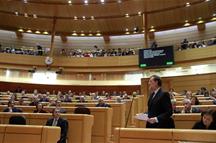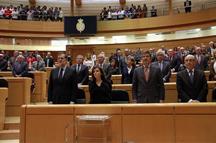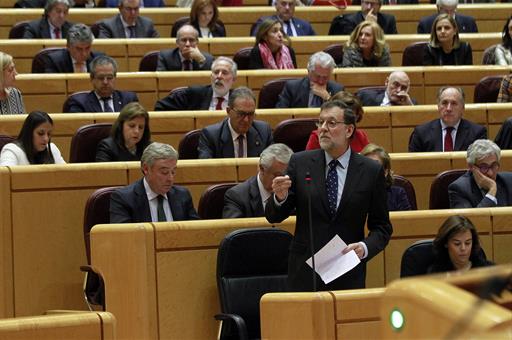Government control session in Upper House
Mariano Rajoy advocates an agreement to guarantee pensions in the long term
President's News - 2017.2.21
Upper House of Parliament, Madrid
During his speech at the government control session held in the Upper House of Parliament, the President of the Government argued that the 0.25% rise in pensions for 2017 was implemented in application of the law and that if this percentage had not been set, it would not have been possible to make this increase.
Mariano Rajoy argued that when he came to power, the system established that pensions were raised in line with the CPI, but that "nobody complied with this", and hence the law was amended so that it could be applied in line with inflation and also with the revenue and expenditure of the system. "If revenue is higher, then pensions rise more, and if revenue drops, then pensions rise less".
The President of the Government responded to the Spokesperson for the Socialist Group, Vicente Álvarez Areces, who enquired after the government forecasts to maintain the purchasing power of pensions, that continuing to create jobs "is the key", because the more people paying into the system, "the better things will be for pensioners and for the country as a whole".
Mariano Rajoy also pointed out that "we must try to reach an understanding" within the framework of the Toledo Pact and take a decision outside of the political debate. "I would like to see an agreement for the future so that within 25 years we have a more objective system of pensions which is not at the whim of the moment. We have every intention of reaching an understanding and an agreement", he stressed.
The President of the Government added that "ideas and collaboration need to be given to the Committee of the Toledo Pact so that things work out well, to resolve the problem and make it objective for many years to come". In his opinion, pensions, which amount to 38% of spending and financing for healthcare, amounting to almost 40%, are Spain's two main challenges.
Importance of relations with United States
 Pool Moncloa/ JM CuadradoAs regards relations with the United States following the election of Donald Trump as president of the country, a question raised by the Member of the Upper House, Ramón Espinar (Unidos Podemos-En Comú Podem-En Marea), Mariano Rajoy pointed out that his goal is to maintain the same relations as those with the administration headed up by Barack Obama.
Pool Moncloa/ JM CuadradoAs regards relations with the United States following the election of Donald Trump as president of the country, a question raised by the Member of the Upper House, Ramón Espinar (Unidos Podemos-En Comú Podem-En Marea), Mariano Rajoy pointed out that his goal is to maintain the same relations as those with the administration headed up by Barack Obama.
Spain and the United States, he maintained, share values and interests, including the fight against terrorism, and their economic relations are "very productive" for the citizens of both countries. The President of the Government recalled that the United States is the leading investor in the Spanish economy and that more than 2 million Americans visit Spain each year.
"It is important that we continue to collaborate and, aside from that, we can disagree or have different opinions on different issues, but in international relations and, in general, as in any walk of life, it is better to focus on issues on which you agree", he expressed. Mariano Rajoy added that his obligation is to defend the interests of Spain, and hence he wishes to have the best possible relations with all Heads of States and Government, as indeed "any responsible leader" would wish to.
The President of the Government stressed that in the phone call he held with Donald Trump, there was no mention of Spain's defence spending. His position on this matter is already well-known. "In Cardiff, at the NATO meeting, we made our commitments and I am prepared to comply with them at the right time".
He also denied that he had spoken with the leader of the United States about the possibility of acting as a mediator with Ibero-America, but defended the role that Spain could play in international accord due to its relationship with these countries, and as a member of the European Union and its "good position" in North Africa. Mariano Rajoy highlighted, in particular, the work carried out by Spain in the EU to remove visa requirements for citizens of several Ibero-American countries and to establish trade agreements there. And, as regards Venezuela, he pointed out that he has never refused to speak with this country, "but aside from dialogue, it would be better for political prisoners to stop being political prisoners and be allowed to walk free".
The President of the Government pointed out that there was no mention in his conversation with Donald Trump of the wall on the border between the United States and Mexico. "I have an immigration policy that is not the same as that of Mr Trump, but that has nothing to do with the relations between Spain and the United States because these things happen with many countries in the world that are not the United States", said Mariano Rajoy, who recalled the message of support and solidarity that he conveyed in another phone call with the President of Mexico, Enrique Peña Nieto.
Dialogue with Catalonia within the law
 Pool Moncloa/ JM CuadradoThe President of the Government called for pro-independence Catalans to "stop inventing operations" by the government against their interests. In response to the Member of the Upper House, Mirella Cortés, who enquired after the so-called 'Operation Catalonia', Mariano Rajoy said that the only operation he has been involved in is that "designed to overcome the worst economic crisis that Spain has suffered in decades and which also affects Catalonia".
Pool Moncloa/ JM CuadradoThe President of the Government called for pro-independence Catalans to "stop inventing operations" by the government against their interests. In response to the Member of the Upper House, Mirella Cortés, who enquired after the so-called 'Operation Catalonia', Mariano Rajoy said that the only operation he has been involved in is that "designed to overcome the worst economic crisis that Spain has suffered in decades and which also affects Catalonia".
Mariano Rajoy underlined that he agrees with many people of Catalonia who want to continue together as Spaniards, as Catalans and as Europeans, and "who believe that we are better off united". He also highlighted that he shares the position of those who "want something as reasonable and democratic as seeing the law upheld and not ignored by politicians".
"I agree on the need for governments to have a degree of personality and for there to be no political forces "outside of the system" that appoint presidents of the Regional Government of Catalonia or that impose certain conditions which, in the end, may lead to a change in the economic and social model in Catalonia", he added.
The President of the Government reiterated his offer for dialogue within the law. In his opinion, we need to tackle "the real problems of people", as happened at the recent Conference of Regional Presidents, to which the Regional Government of Catalonia did not attend, in the same way that it chose not to send a representative to the working group to tackle regional financing.
The President of the Government invited them to attend in order to tackle this issue, as well as to talk about the Budget, investments, and infrastructure and decide on how "to ensure that institutions are not there to only serve people of a certain ideology". "There are many people in Catalonia who are not in favour of independence and whose views are not reflected in the actions of the Regional Government of Catalonia", he concluded.





